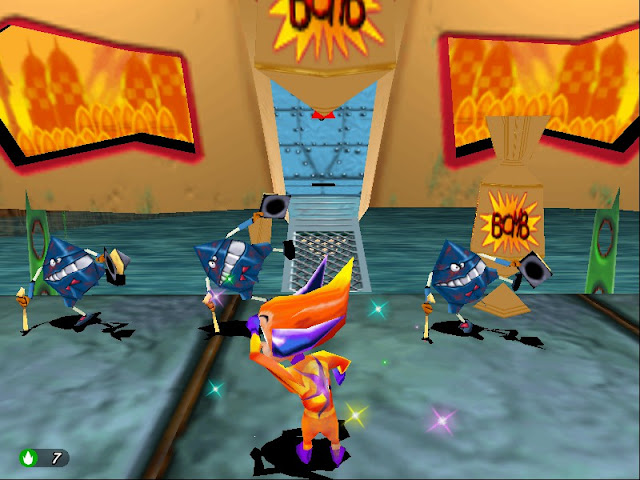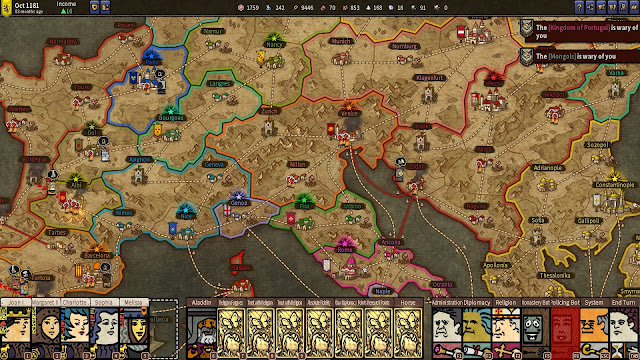Rising Kingdoms Review | A forgotten strategy game

Sometimes it happens that a title gets lost in a period of releases of similar games of the same genre in a short span of time and it gets forgotten.
Rising Kingdoms is one such a game, but it doesn't mean it should be ignored.
Aesthetics

|
You must always be ready to battle
|
The game utilizes bi-dimensional graphics with pre-rendered sprites and saturated colors, a bit out of the norm for 2005, since almost all developers had switched to the use of 3D polygons, but it is curated enough to not be a negative.
The particle effects are a bit underwhelming, it can happen that you are not able to see them in the heat of battle. It is a bad thing when they must depict important actions like healing.
The animations are ok, with the ones dedicated to the destruction of structures particularly well defined.
The voice acting is really ugly, the lines are spoken in a dull and monotonous way, they don't convince at all.
The soundtrack is competent, but some parts feel out of place, a track in particular seems to have the THX sound test, it isn't necessarily a bad thing, but it could annoy someone.
The tracks are played randomly, without any of them being exclusive to one race or specific situation.
Nothing to say about the sound effects, they are alright.
The game does not offer a native 16:9 resolution, to have that you must use a fan made patch that you can get from this guide here.
Summarizing, while it may have looked dated back in the day, the usage of 2d sprites has managed to keep the looks of the game fresh.
Game Mechanics

|
The colonies generate uncontrollable guardians that do not
hurt the economy
|
Like many other real time strategy games, Rising Kingdoms is about gathering resources, building production/defense structures and command your troops in effective tactics to defeat your enemies.
There are 3 playable races: the humans, the foresters and the darklings, these races are asynchronous and possess different kind of units and strategies. The humans are the most standard, with a well balanced army composed of various offensive and support units. The foresters have an army voted to a defensive play style. It is the only race in which the structures can heal themselves without any cost. The darklings have an aim to an offensive play style and it is the only race in which the warriors can regenerate their health without needing dedicated units, even if some abilities of the heroes can help them heal faster.
A unique feature of the game is in conquerable colonies populated by minor neutral races, once defeated the guardians, the colony now in the hands of the winner is capable to train the units of that race and choose a power up between two.
Interesting, since it can fill the gap in the unit roster of a race. For example, the foresters don't have a way to heal themselves in the heat of battle, only at the main base, after conquering an elven colony it is possible to hire a healer and make up for their vulnerability.
But beyond the races a strategy game require some kind of economy, which in this title is represented by three currencies: gold, gems and glory.
Gold is the basic resource that is used for everything and it is gathered in
mines that are built over a vein. The gems are an advanced resource used for productions in the mid and late
game, it is gathered from deposits located in rivers. Glory is a particular resource that is gained through various ways. The most common method is to defeat the guardians of a colony that, once
conquered, will grant the winner new ways to gain glory. For example, if you conquer an elven colony you can gain glory by picking up
the objects(I am going to talk about these later) fallen from defeated enemies. It is always possible to see the methods to gain glory by clicking on your own
town center and then click on the coin shaped button. Glory is used to create new homes which rise the population cap, to recruit
heroes(only on the skirmish maps, in the campaigns you don't have to) and to
unlock their abilities, since they don't level up.
The economy present is very similar to other titles of this genre, but the addition of glory allows a layer of complexity that makes the game distinguish from the norm.
Now onto the base-building aspect.
Every player has a castle that if destroyed almost always leads to immediate defeat. To build, you don't use workers, but you select your fortress and then choose the desired structure plus the position. The building process has a limitation: it is not possible to build too far from the castle. The only thing the workers can build are towers and resource gathering centers.
It didn't bother me, but if you are a person that likes to build without restrictions, you may not like this.
Let's talk about the heroes.
Every race has 4 available heroes, each one covering an aspect of that race roster. For example, the humans have a melee dedicated hero, one dedicated to ranged combat, another one is a raider knight with hit-and-run abilities while the last one is a witch that casts spells and curses. Each one of these heroes have a corresponding basic unit that can be buffed or supported based on the selected abilities. Two small notes on more in depth concepts, the units can turn invisible and to see them you use a detector. The detector is not mandatory, since these units can be revealed when they enter in physical contact with your own, but they must be attacked manually and your troops will suffer a 66% penalty to their precision.
On the objects, the units killed in battle can drop consumables that permanently increase the statistics of any hero that picks them up or equippable weapons and artifacts. Beware, your units drop these items too and I've often seen the enemy champions pick them up.
As a matter of fact, the AI puts a good challenge, in my game sessions I've seen it do retreat, baiting and retrieving operations, which made me put more effort in my battles.
Playing all the missions in the 3 campaigns on normal difficulty, I've beaten the game in 27 hours and a half.
In short, there are a lot of nice systems in this game, still good and interesting to this day.
Narrative

|
A chunk of the story is expressed through pre-mission
texts
|
In the fantasy land of Equiada we follow the tales of the 3 major races: the humans, the foresters and the darklings.
The first campaign follows paladin Vigor in his fight against the Shimmering order for the royal throne granted by his birth-right. The second one tells of Quellia, wolf tamer, and her ambition to become the supreme ruler of the forest. The third one is about the Darklings, servants of the god of death and defenders of an artifact that it is believed to be a portal to the land of the gods.
The proposed narrative is fine, with some twist here and there, but it's structured in an odd way, the order suggested to play is inverted compared to the canonical order of events. In fact, the human campaign is, in the canon, the last one to happen, with the one of the foresters happening in the middle and finally the events in the campaign of the Darklings are the first one to happen.
It isn't a bad thing, but it does make me wonder why do such a thing, sometimes the story is confusing and hard to follow, I have seen events in the game without explanation and apparently disjointed from the main plot. This happens especially in the human campaign and less in the other two.
The characters are superficial, they are not deep or explored, they never change personality or face emotional challenges, they are hard to remember and not interesting.
Surprisingly, there has been an attempt to world-building with some myths placed in the narrative that seem to have influenced the events in the story.
The myths are displayed to the player with dialogues boxes.
In conclusion, the narrative is very hit-and-miss.
Recommendation:
Rising Kingdoms may not be the most original title, but it does manage to be a fun game.
Available on Steam



Comments
Post a Comment